George Brown College Business Law - Assignment 2: Legal Principles
VerifiedAdded on 2022/09/06
|7
|1428
|43
Homework Assignment
AI Summary
This assignment addresses key concepts in business law, focusing on the distinctions between actual and apparent authority within agency law, exploring various methods of forming agency contracts, and analyzing a scenario involving fiduciary duties. The assignment also examines the legal status of an independent contractor versus an employee, based on a case study. The student provides detailed explanations, supporting arguments with legal principles and relevant case law, and demonstrates an understanding of Canadian business law. The answers are well-organized and supported by citations from legal textbooks and scholarly sources, fulfilling the assignment requirements. The student provides detailed explanations, supporting arguments with legal principles and relevant case law, and demonstrates an understanding of Canadian business law.
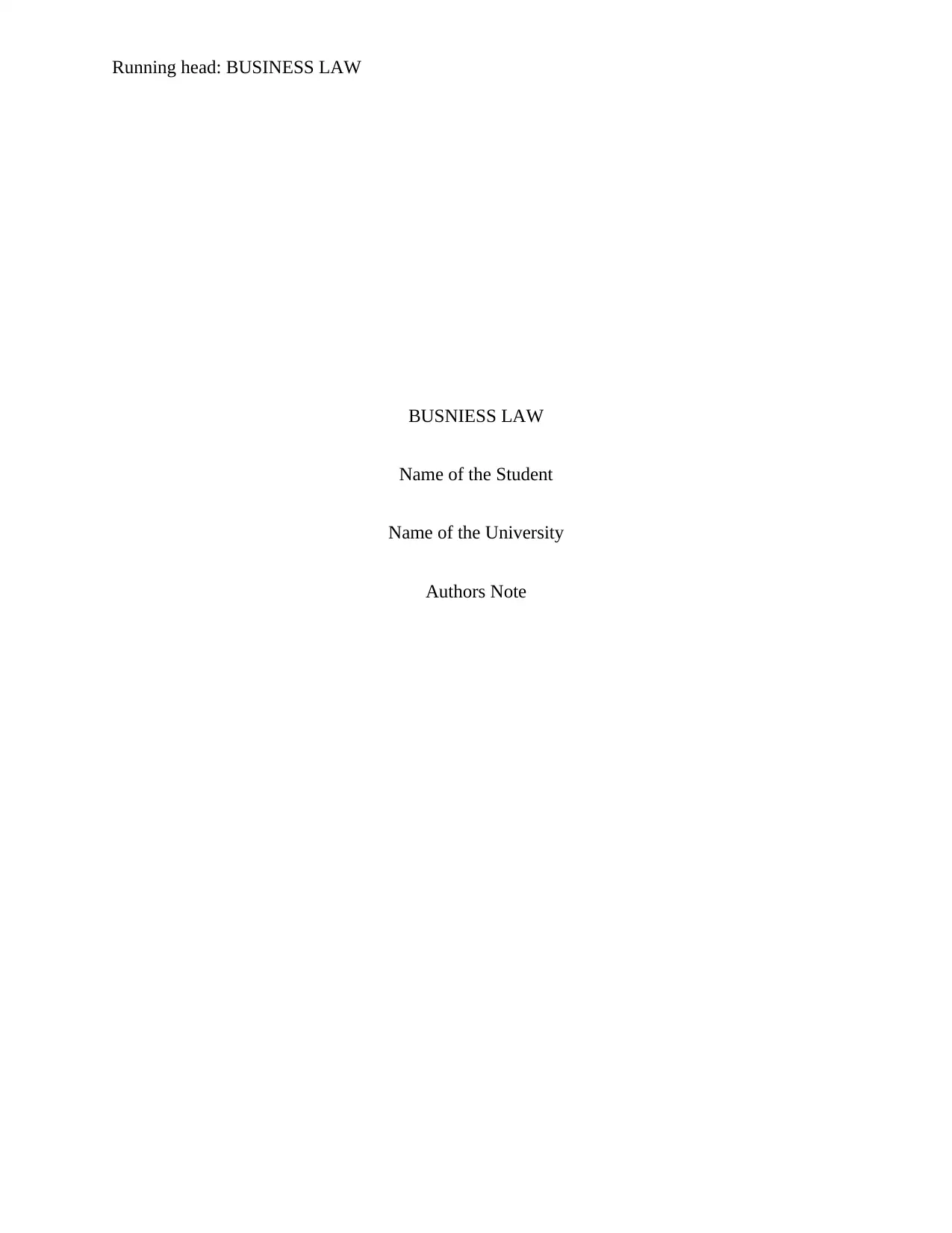
Running head: BUSINESS LAW
BUSNIESS LAW
Name of the Student
Name of the University
Authors Note
BUSNIESS LAW
Name of the Student
Name of the University
Authors Note
Paraphrase This Document
Need a fresh take? Get an instant paraphrase of this document with our AI Paraphraser
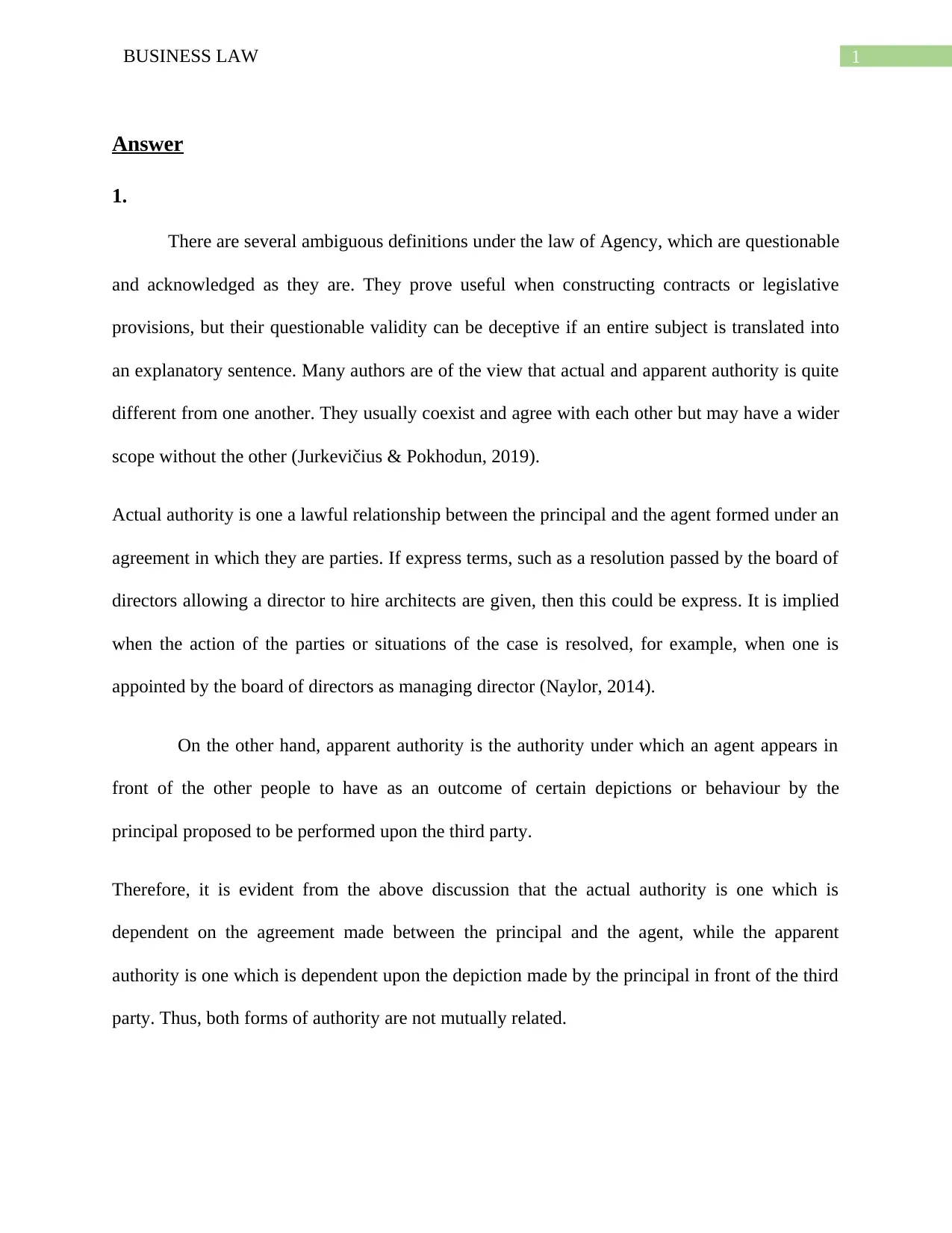
1BUSINESS LAW
Answer
1.
There are several ambiguous definitions under the law of Agency, which are questionable
and acknowledged as they are. They prove useful when constructing contracts or legislative
provisions, but their questionable validity can be deceptive if an entire subject is translated into
an explanatory sentence. Many authors are of the view that actual and apparent authority is quite
different from one another. They usually coexist and agree with each other but may have a wider
scope without the other (Jurkevičius & Pokhodun, 2019).
Actual authority is one a lawful relationship between the principal and the agent formed under an
agreement in which they are parties. If express terms, such as a resolution passed by the board of
directors allowing a director to hire architects are given, then this could be express. It is implied
when the action of the parties or situations of the case is resolved, for example, when one is
appointed by the board of directors as managing director (Naylor, 2014).
On the other hand, apparent authority is the authority under which an agent appears in
front of the other people to have as an outcome of certain depictions or behaviour by the
principal proposed to be performed upon the third party.
Therefore, it is evident from the above discussion that the actual authority is one which is
dependent on the agreement made between the principal and the agent, while the apparent
authority is one which is dependent upon the depiction made by the principal in front of the third
party. Thus, both forms of authority are not mutually related.
Answer
1.
There are several ambiguous definitions under the law of Agency, which are questionable
and acknowledged as they are. They prove useful when constructing contracts or legislative
provisions, but their questionable validity can be deceptive if an entire subject is translated into
an explanatory sentence. Many authors are of the view that actual and apparent authority is quite
different from one another. They usually coexist and agree with each other but may have a wider
scope without the other (Jurkevičius & Pokhodun, 2019).
Actual authority is one a lawful relationship between the principal and the agent formed under an
agreement in which they are parties. If express terms, such as a resolution passed by the board of
directors allowing a director to hire architects are given, then this could be express. It is implied
when the action of the parties or situations of the case is resolved, for example, when one is
appointed by the board of directors as managing director (Naylor, 2014).
On the other hand, apparent authority is the authority under which an agent appears in
front of the other people to have as an outcome of certain depictions or behaviour by the
principal proposed to be performed upon the third party.
Therefore, it is evident from the above discussion that the actual authority is one which is
dependent on the agreement made between the principal and the agent, while the apparent
authority is one which is dependent upon the depiction made by the principal in front of the third
party. Thus, both forms of authority are not mutually related.
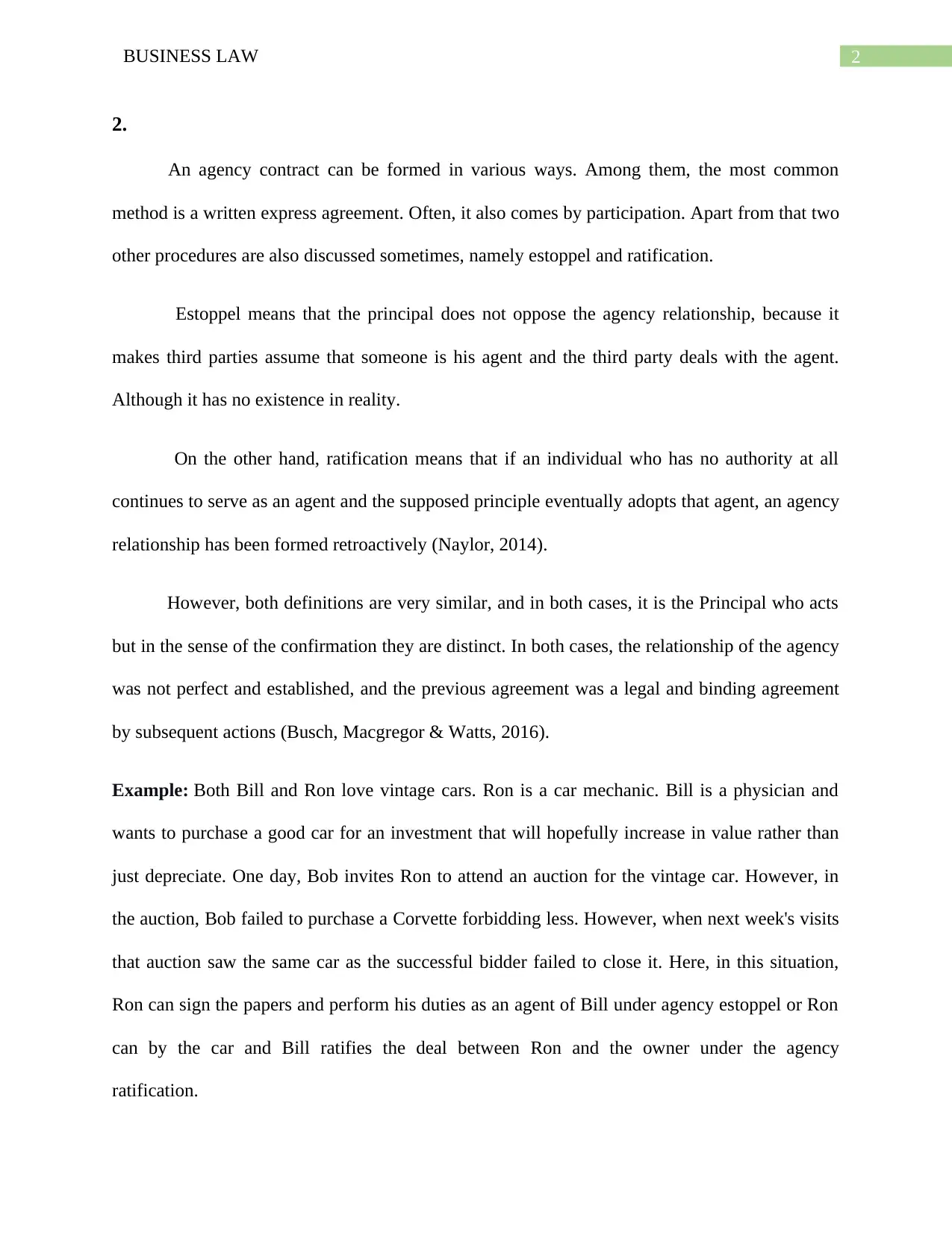
2BUSINESS LAW
2.
An agency contract can be formed in various ways. Among them, the most common
method is a written express agreement. Often, it also comes by participation. Apart from that two
other procedures are also discussed sometimes, namely estoppel and ratification.
Estoppel means that the principal does not oppose the agency relationship, because it
makes third parties assume that someone is his agent and the third party deals with the agent.
Although it has no existence in reality.
On the other hand, ratification means that if an individual who has no authority at all
continues to serve as an agent and the supposed principle eventually adopts that agent, an agency
relationship has been formed retroactively (Naylor, 2014).
However, both definitions are very similar, and in both cases, it is the Principal who acts
but in the sense of the confirmation they are distinct. In both cases, the relationship of the agency
was not perfect and established, and the previous agreement was a legal and binding agreement
by subsequent actions (Busch, Macgregor & Watts, 2016).
Example: Both Bill and Ron love vintage cars. Ron is a car mechanic. Bill is a physician and
wants to purchase a good car for an investment that will hopefully increase in value rather than
just depreciate. One day, Bob invites Ron to attend an auction for the vintage car. However, in
the auction, Bob failed to purchase a Corvette forbidding less. However, when next week's visits
that auction saw the same car as the successful bidder failed to close it. Here, in this situation,
Ron can sign the papers and perform his duties as an agent of Bill under agency estoppel or Ron
can by the car and Bill ratifies the deal between Ron and the owner under the agency
ratification.
2.
An agency contract can be formed in various ways. Among them, the most common
method is a written express agreement. Often, it also comes by participation. Apart from that two
other procedures are also discussed sometimes, namely estoppel and ratification.
Estoppel means that the principal does not oppose the agency relationship, because it
makes third parties assume that someone is his agent and the third party deals with the agent.
Although it has no existence in reality.
On the other hand, ratification means that if an individual who has no authority at all
continues to serve as an agent and the supposed principle eventually adopts that agent, an agency
relationship has been formed retroactively (Naylor, 2014).
However, both definitions are very similar, and in both cases, it is the Principal who acts
but in the sense of the confirmation they are distinct. In both cases, the relationship of the agency
was not perfect and established, and the previous agreement was a legal and binding agreement
by subsequent actions (Busch, Macgregor & Watts, 2016).
Example: Both Bill and Ron love vintage cars. Ron is a car mechanic. Bill is a physician and
wants to purchase a good car for an investment that will hopefully increase in value rather than
just depreciate. One day, Bob invites Ron to attend an auction for the vintage car. However, in
the auction, Bob failed to purchase a Corvette forbidding less. However, when next week's visits
that auction saw the same car as the successful bidder failed to close it. Here, in this situation,
Ron can sign the papers and perform his duties as an agent of Bill under agency estoppel or Ron
can by the car and Bill ratifies the deal between Ron and the owner under the agency
ratification.
⊘ This is a preview!⊘
Do you want full access?
Subscribe today to unlock all pages.

Trusted by 1+ million students worldwide
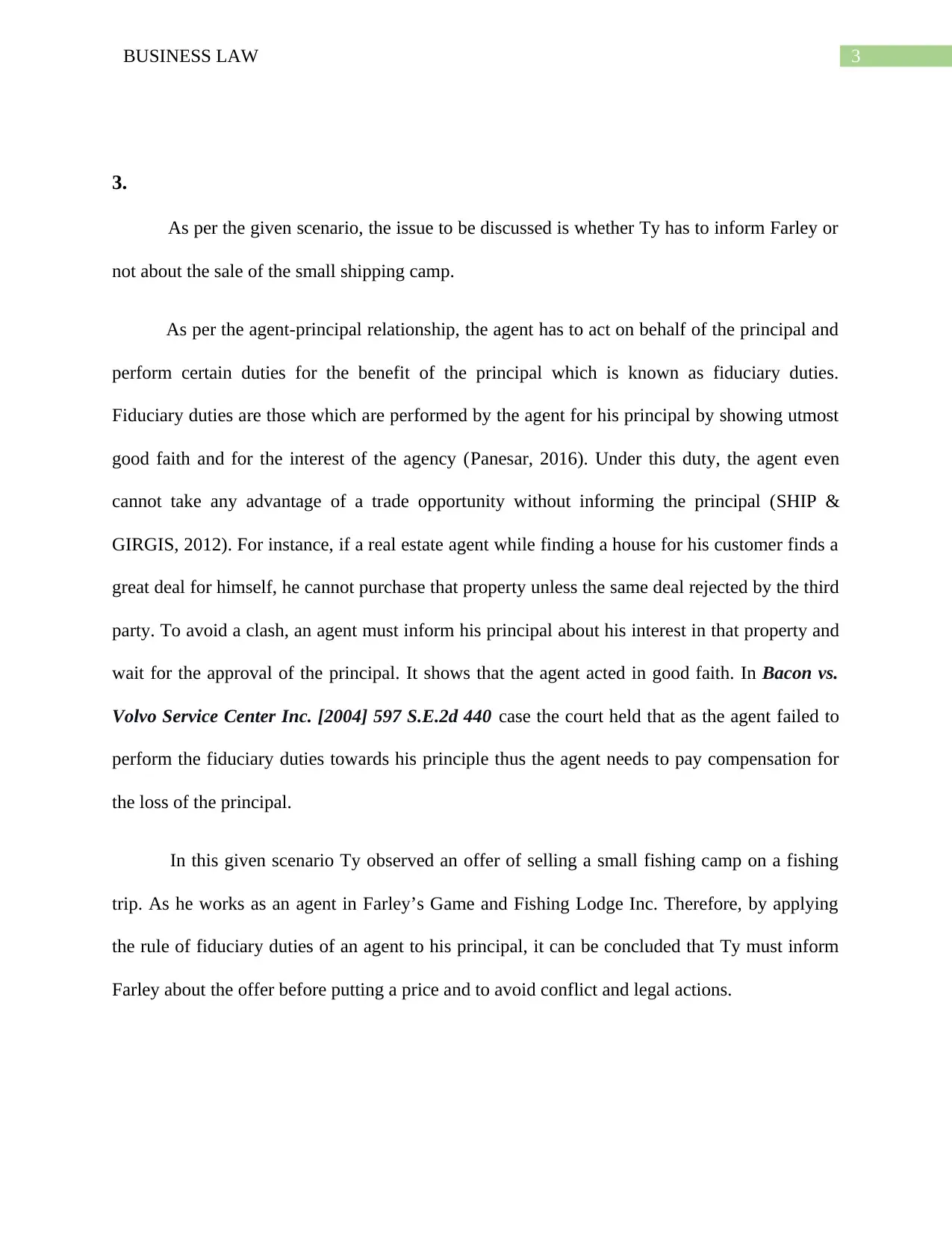
3BUSINESS LAW
3.
As per the given scenario, the issue to be discussed is whether Ty has to inform Farley or
not about the sale of the small shipping camp.
As per the agent-principal relationship, the agent has to act on behalf of the principal and
perform certain duties for the benefit of the principal which is known as fiduciary duties.
Fiduciary duties are those which are performed by the agent for his principal by showing utmost
good faith and for the interest of the agency (Panesar, 2016). Under this duty, the agent even
cannot take any advantage of a trade opportunity without informing the principal (SHIP &
GIRGIS, 2012). For instance, if a real estate agent while finding a house for his customer finds a
great deal for himself, he cannot purchase that property unless the same deal rejected by the third
party. To avoid a clash, an agent must inform his principal about his interest in that property and
wait for the approval of the principal. It shows that the agent acted in good faith. In Bacon vs.
Volvo Service Center Inc. [2004] 597 S.E.2d 440 case the court held that as the agent failed to
perform the fiduciary duties towards his principle thus the agent needs to pay compensation for
the loss of the principal.
In this given scenario Ty observed an offer of selling a small fishing camp on a fishing
trip. As he works as an agent in Farley’s Game and Fishing Lodge Inc. Therefore, by applying
the rule of fiduciary duties of an agent to his principal, it can be concluded that Ty must inform
Farley about the offer before putting a price and to avoid conflict and legal actions.
3.
As per the given scenario, the issue to be discussed is whether Ty has to inform Farley or
not about the sale of the small shipping camp.
As per the agent-principal relationship, the agent has to act on behalf of the principal and
perform certain duties for the benefit of the principal which is known as fiduciary duties.
Fiduciary duties are those which are performed by the agent for his principal by showing utmost
good faith and for the interest of the agency (Panesar, 2016). Under this duty, the agent even
cannot take any advantage of a trade opportunity without informing the principal (SHIP &
GIRGIS, 2012). For instance, if a real estate agent while finding a house for his customer finds a
great deal for himself, he cannot purchase that property unless the same deal rejected by the third
party. To avoid a clash, an agent must inform his principal about his interest in that property and
wait for the approval of the principal. It shows that the agent acted in good faith. In Bacon vs.
Volvo Service Center Inc. [2004] 597 S.E.2d 440 case the court held that as the agent failed to
perform the fiduciary duties towards his principle thus the agent needs to pay compensation for
the loss of the principal.
In this given scenario Ty observed an offer of selling a small fishing camp on a fishing
trip. As he works as an agent in Farley’s Game and Fishing Lodge Inc. Therefore, by applying
the rule of fiduciary duties of an agent to his principal, it can be concluded that Ty must inform
Farley about the offer before putting a price and to avoid conflict and legal actions.
Paraphrase This Document
Need a fresh take? Get an instant paraphrase of this document with our AI Paraphraser
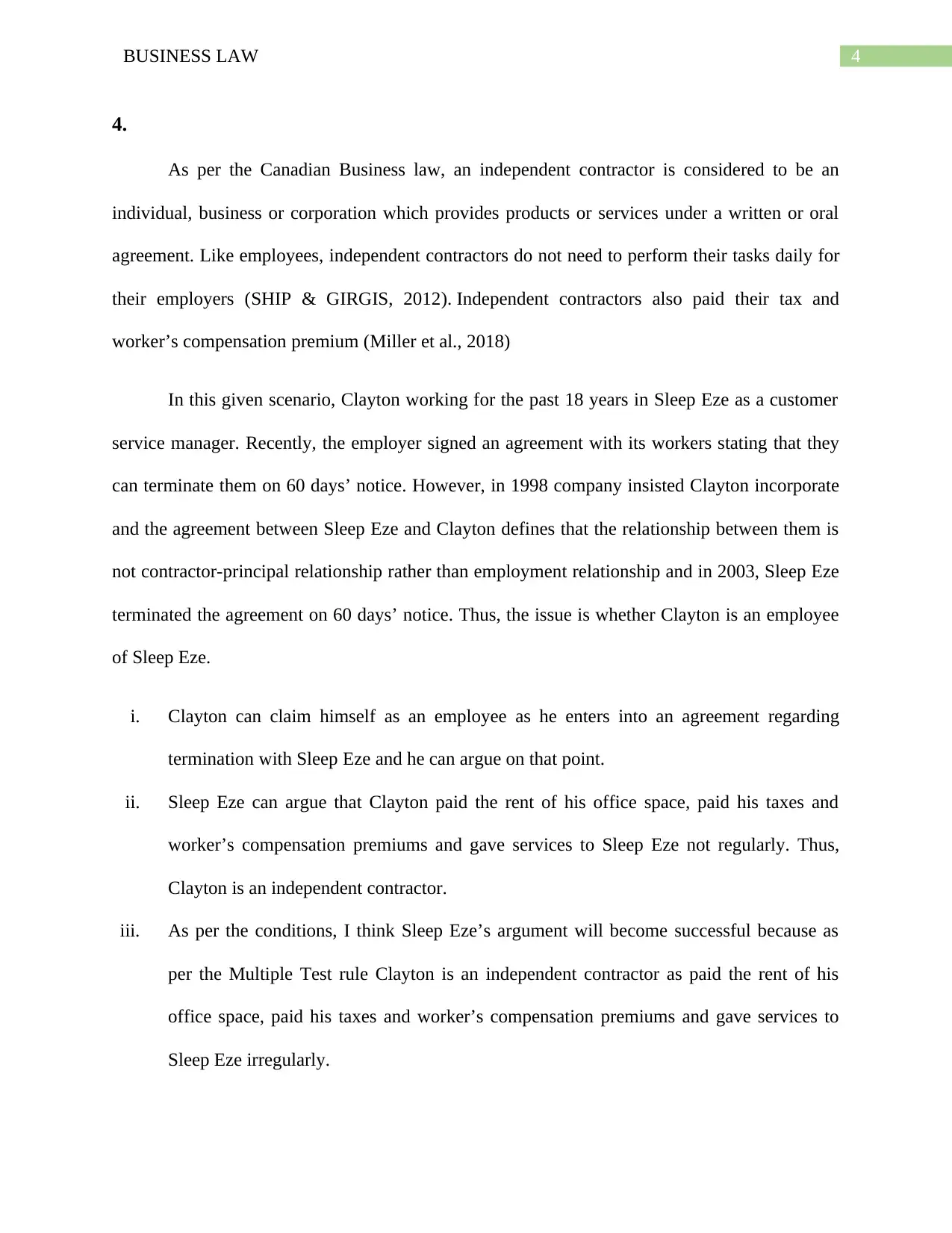
4BUSINESS LAW
4.
As per the Canadian Business law, an independent contractor is considered to be an
individual, business or corporation which provides products or services under a written or oral
agreement. Like employees, independent contractors do not need to perform their tasks daily for
their employers (SHIP & GIRGIS, 2012). Independent contractors also paid their tax and
worker’s compensation premium (Miller et al., 2018)
In this given scenario, Clayton working for the past 18 years in Sleep Eze as a customer
service manager. Recently, the employer signed an agreement with its workers stating that they
can terminate them on 60 days’ notice. However, in 1998 company insisted Clayton incorporate
and the agreement between Sleep Eze and Clayton defines that the relationship between them is
not contractor-principal relationship rather than employment relationship and in 2003, Sleep Eze
terminated the agreement on 60 days’ notice. Thus, the issue is whether Clayton is an employee
of Sleep Eze.
i. Clayton can claim himself as an employee as he enters into an agreement regarding
termination with Sleep Eze and he can argue on that point.
ii. Sleep Eze can argue that Clayton paid the rent of his office space, paid his taxes and
worker’s compensation premiums and gave services to Sleep Eze not regularly. Thus,
Clayton is an independent contractor.
iii. As per the conditions, I think Sleep Eze’s argument will become successful because as
per the Multiple Test rule Clayton is an independent contractor as paid the rent of his
office space, paid his taxes and worker’s compensation premiums and gave services to
Sleep Eze irregularly.
4.
As per the Canadian Business law, an independent contractor is considered to be an
individual, business or corporation which provides products or services under a written or oral
agreement. Like employees, independent contractors do not need to perform their tasks daily for
their employers (SHIP & GIRGIS, 2012). Independent contractors also paid their tax and
worker’s compensation premium (Miller et al., 2018)
In this given scenario, Clayton working for the past 18 years in Sleep Eze as a customer
service manager. Recently, the employer signed an agreement with its workers stating that they
can terminate them on 60 days’ notice. However, in 1998 company insisted Clayton incorporate
and the agreement between Sleep Eze and Clayton defines that the relationship between them is
not contractor-principal relationship rather than employment relationship and in 2003, Sleep Eze
terminated the agreement on 60 days’ notice. Thus, the issue is whether Clayton is an employee
of Sleep Eze.
i. Clayton can claim himself as an employee as he enters into an agreement regarding
termination with Sleep Eze and he can argue on that point.
ii. Sleep Eze can argue that Clayton paid the rent of his office space, paid his taxes and
worker’s compensation premiums and gave services to Sleep Eze not regularly. Thus,
Clayton is an independent contractor.
iii. As per the conditions, I think Sleep Eze’s argument will become successful because as
per the Multiple Test rule Clayton is an independent contractor as paid the rent of his
office space, paid his taxes and worker’s compensation premiums and gave services to
Sleep Eze irregularly.

5BUSINESS LAW
⊘ This is a preview!⊘
Do you want full access?
Subscribe today to unlock all pages.

Trusted by 1+ million students worldwide
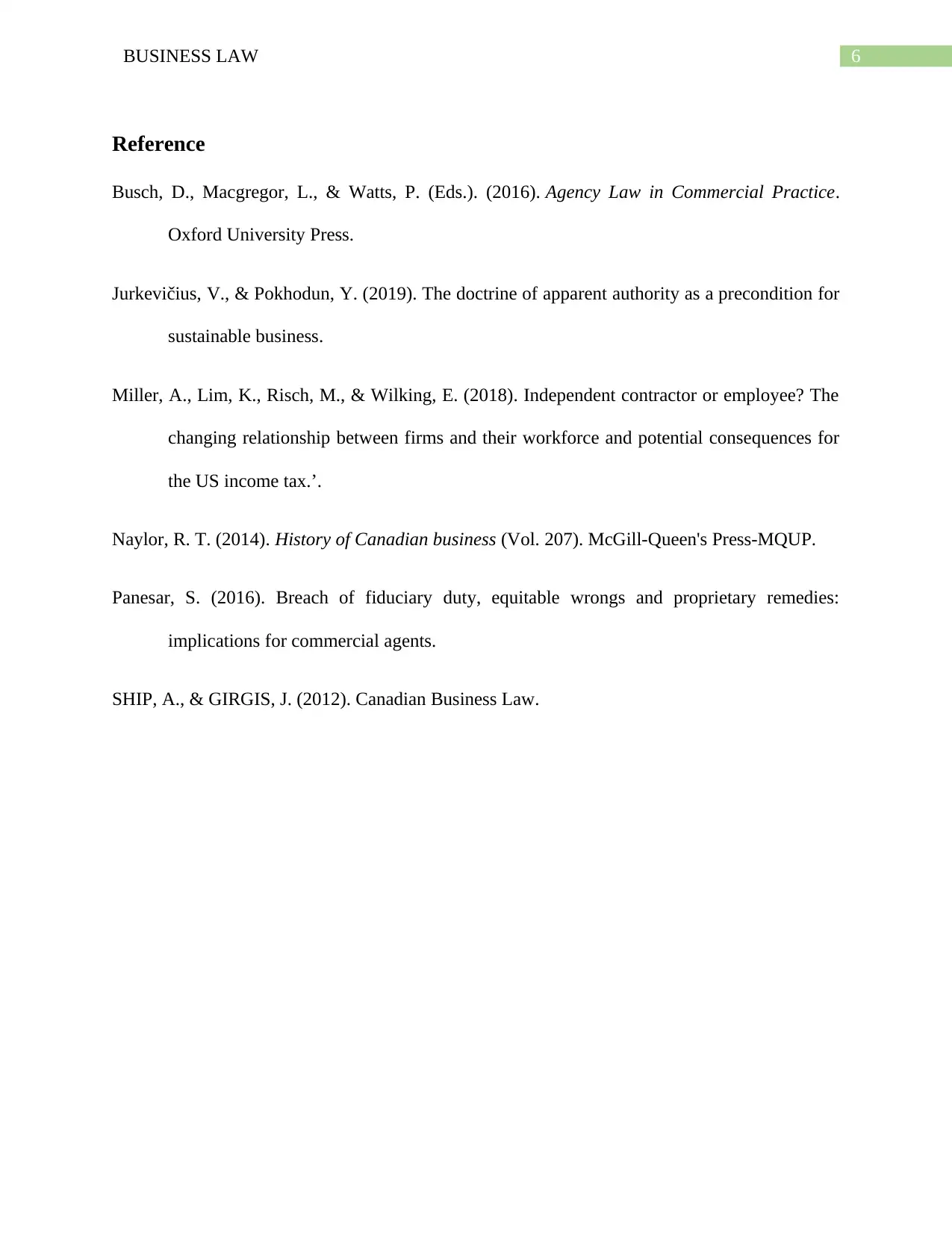
6BUSINESS LAW
Reference
Busch, D., Macgregor, L., & Watts, P. (Eds.). (2016). Agency Law in Commercial Practice.
Oxford University Press.
Jurkevičius, V., & Pokhodun, Y. (2019). The doctrine of apparent authority as a precondition for
sustainable business.
Miller, A., Lim, K., Risch, M., & Wilking, E. (2018). Independent contractor or employee? The
changing relationship between firms and their workforce and potential consequences for
the US income tax.’.
Naylor, R. T. (2014). History of Canadian business (Vol. 207). McGill-Queen's Press-MQUP.
Panesar, S. (2016). Breach of fiduciary duty, equitable wrongs and proprietary remedies:
implications for commercial agents.
SHIP, A., & GIRGIS, J. (2012). Canadian Business Law.
Reference
Busch, D., Macgregor, L., & Watts, P. (Eds.). (2016). Agency Law in Commercial Practice.
Oxford University Press.
Jurkevičius, V., & Pokhodun, Y. (2019). The doctrine of apparent authority as a precondition for
sustainable business.
Miller, A., Lim, K., Risch, M., & Wilking, E. (2018). Independent contractor or employee? The
changing relationship between firms and their workforce and potential consequences for
the US income tax.’.
Naylor, R. T. (2014). History of Canadian business (Vol. 207). McGill-Queen's Press-MQUP.
Panesar, S. (2016). Breach of fiduciary duty, equitable wrongs and proprietary remedies:
implications for commercial agents.
SHIP, A., & GIRGIS, J. (2012). Canadian Business Law.
1 out of 7
Related Documents
Your All-in-One AI-Powered Toolkit for Academic Success.
+13062052269
info@desklib.com
Available 24*7 on WhatsApp / Email
![[object Object]](/_next/static/media/star-bottom.7253800d.svg)
Unlock your academic potential
Copyright © 2020–2026 A2Z Services. All Rights Reserved. Developed and managed by ZUCOL.





